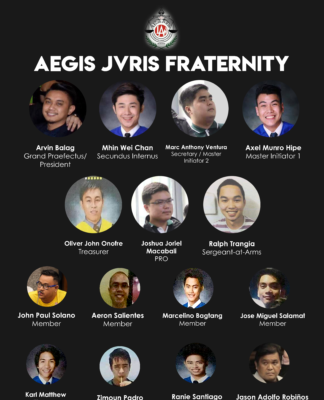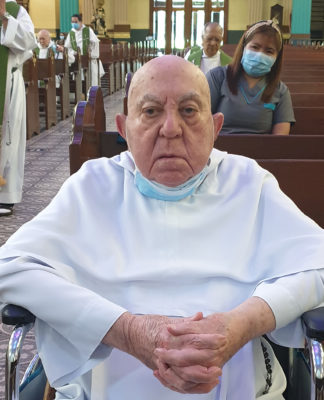DID PRESIDENT Benigno “Noynoy” Aquino III fulfill the promise of “Daang Matuwid”?
Aquino, who was inaugurated as the 15th President of the Philippines in June 2010, promised progress anchored on fighting corruption, as embodied in his campaign slogan “Kung walang corrupt, walang mahirap” (“If there’s no corruption, there’s no poverty”).
With barely two months left in his term, it is time to look back at what his administration has done in of the last six years.
In his 2010 presidential campaign, Aquino ran on a 16-point agenda dubbed as his “social contract with the Filipinos.” His contract sought to address the following: corruption, employment and inclusive growth, education, advancement of public health and responsible parenthood, the justice system, execution of policies without regard for private interests, improvement of the rural economy and food security, well-considered poverty programs, growth of big and small businesses, protection of overseas Filipino workers (OFWs), competent presidential appointees, motivated and well-supported civil servants, a stronger military and police, promotion of gender equality, long-term peace in Mindanao, alternative and inclusive urban development and safe communities, and sustainable use of natural resources.
Corruption and poverty
First on Aquino’s agenda was an anti-corruption drive to remove corrupt officials.
Aquino sought the imprisonment of supposedly corrupt officials, including former President Gloria Macapagal-Arroyo and the late former chief justice Renato Corona. Senate investigations on military corruption led to the suicide of former defense chief Angelo Reyes.
UST Political Science department Chairman Dennis Coronacion said Aquino did a “good job” in minimizing corruption in the government.
“He did not completely eradicate corruption, but he was successful in minimizing it. ‘Yung mga departments under the government, binantayan talaga,” Coronacion said in an interview with the Varsitarian.
Several politicians were linked to the misuse of pork barrel or Priority Development Assistance Funds (PDAF) in 2013, including former Senate President Juan Ponce Enrile and Senators Ramon Revilla Jr. and Jinggoy Estrada.
In addition, the alleged “pork barrel queen” Janet Lim Napoles was jailed for the misuse of PDAF through her non-existent non-governmental organizations. But Aquino was accused of selectively prosecuting politicians in the PDAF scam, as a number of allies dragged into the controversy continue to be scot-free.
In 2014, Transportation Secretary Jun Abaya was accused of getting kickbacks in biddings involving the Metro Rail Transit.
Jobless economic growth
The Pantawid Pampamilyang Filipino Program or 4Ps, a conditional cash transfer program that operates in all 17 regions of the Philippines, is the administration’s biggest program to alleviate poverty, said Coronacion.
Under the Aquino administration, the Philippines’ gross domestic product growth rate hit 6 percent, which Coronacion said was relatively good.
But UST Department of Economics Chairman Emmanuel Lopez said the economy under the Aquino administration promoted “exclusive growth” instead of a sustainable and inclusive one.
“Gumanda rin naman ‘yung economy natin kaso what we were aiming for was sustainable growth, which should affect all sectors of the society from the grassroots to the top. What we have now is exclusive growth and not inclusive,” Lopez said.
In the first half of 2012, the percentage of people living in poverty was at 27.9 percent according to the Philippine Statistics Authority. The figure stood at 26.3 in 2015.
“Kung nabawasan man, very insignificant. It is the biggest failure of the administration—to eradicate poverty,” Lopez said.
Employment
Second on Aquino’s list was the promotion of “inclusive growth” and reducing unemployment. Inclusive growth is a catchphrase for economic policies benefiting the poor.
Lopez said the Aquino administration failed to address joblessness, creating only contractual jobs.
“Naka-create naman ng jobs [ang Aquino administration] pero puro contractual lang. Dati 12 million ang unemployed, ngayon 9 million pa rin,” Lopez said.
Coronacion also said the administration was able to produce jobs, but failed to provide quality ones.
“They have managed to create thousands of jobs, [however] these are not the quality jobs we are looking for,” he said.
In terms of inclusive growth, Coronacion said Aquino failed to include the poor in the growing economy.
“There are still a lot of poor [families] and there is a huge gap between the rich and the poor,” he added.
Education
In his first State of the Nation Address in 2010, Aquino announced his intention to reform the education system in the Philippines by shifting to the K to 12 curriculum, which requires 12 year of basic education. But when Aquino signed the K to 12 Law in 2013, critics said the government was unprepared for the transition.
The Department of Education ordered the construction of 30,000 classrooms in 6,000 city and municipal schools. In addition, more than 3,000 private schools, state universities and colleges, local universities and colleges and technical-vocational institutions were given permits to open senior high schools, with support from enrollment vouchers to be issued by the national government.
The Philippines was the last Asian country and one of only three countries worldwide with a 10-year pre-university cycle. The others were African countries Angola and Djibouti.
For Coronacion, the implementation of the K to 12 was a good move by the Aquino administration, but it brought problems. Thousands of tertiary-level teachers are set to lose their jobs because college enrollment is expected to drop, with students spending two more years in high school. Many colleges and universities are expected to shut down.
“A lot of people lost their jobs, but give it five years and the problems that K to 12 brought will be solved,” Coronacion said.
According to Rene Tadle of the Council of Teachers and Staff of Colleges and Universities of the Philippines, the rushed implementation of K to 12 was meant to allow Aquino to claim it has his “legacy.”
“The objectives of the K to 12 are laudable but they are merely a wish list,” said Tadle in an interview.
The Aquino administration claims that students who graduate under K to 12 will get jobs easily and perform well in college.
For Tadle, the implementation is a “disaster” for students who cannot afford to continue education and for teachers who will lose their jobs, as well as their families.
“[However], many schools, in the long run, would earn more profit because of the additional income [from students],” he added. “But for teachers and non-academic staff, [it would mean] more contractualization.”
He also added that the country was not ready for the K to 12 curriculum because of its sudden implementation.
“It is rather sad that the entire educational system of the country is dependent on the wish of a person who happens to be the president, because he just wants to have a legacy,” Tadle said.
Tadle said Aquino failed to address the concerns of teachers over the expected big number of dropouts in high school.
“They provided a voucher system to students who can go to private schools. But the problem is that the voucher system is not enough to pay for a student’s tuition,” he added.
Peace and order
As regards peace and order, the Aquino administration failed to reduce crime, Coronacion said.
In 2011, a total of 248,378 crimes were committed. It was lower by 23.36 percent compared with 2010 and about half of the total recorded crimes in 2009. However, from 2012 to 2014, the crime rate rose by 26 percent to 36 percent. By 2015, the crime rate jumped by 50 percent.
According to Coronacion, Aquino was serious in promoting peace and order, but was not successful in implementation. Aquino’s legacy could have been the attainment of peace in rebel-infested Mindanao.
“He was almost there, but he failed because of the Mamasapano incident. Before this incident, there were ongoing peace talks between the government and the Moro Islamic Liberation Front,” Coronacion said.
Other issues
The Aquino administration did a good job of giving the OFWs protection. However, there were certain instances wherein Aquino failed, such as in the case of Mary Jane Veloso who is on death row for smuggling heroin to Indonesia, and Joselito Zapanta who was executed for murder and robbery in Saudi Arabia.
As regards the appointment of competent presidential appointees, Aquino did an “okay” job except for his appointment of Abaya as transportation secretary and Alan Purisima as Philippine National Police chief. Purisima is liable for the Mamasapano carnage and was allegedly involved in anomalous million-peso transactions with a private courier company, Coronacion said.
Aquino prioritized loyalty over competence among his cabinet members, he pointed out.
Lopez deemed Aquino as “ineffective” when it came to promoting rural development.
“Meron pa rin tayong crucial traffic problems, like the transport systems of the LRT and MRT. Joblessness ay talamak pa rin, crime rate ay mataas pa rin,” Lopez said.
On gender equality, food security, impartial execution of policies, growth of big and small businesses and sustainable use of natural resources for future generations, Coronacion said the Aquino administration put on a low profile, not being able to implement major policies and laws to address these issues.
The reproductive health law was passed amid heavy opposition from the Catholic Church and lay groups, who were able to get redress from a Supreme Court ruling that invalidated many contested provisions.
Aquino signed the new Salary Standardization Law earlier this year to give 1.6 million civil servants a 27-percent increase in their salaries.
As for inclusive urban growth, Aquino’s public-private partnership (PPP) scheme was significantly delayed because of inefficiencies and bidding technicalities. Only 12 of more than 50 PPP contracts were awarded, mostly to large conglomerates who were also Aquino supporters, like Ayala Corp. and San Miguel. Only three projects will be finished by the end of Aquino’s term, instead of the five promised.
Lapses
Coronacion said Aquino should have done something to pass the Freedom of Information (FOI) bill, which would mandate the disclosure of official documents to the public.
“When he was still a senator, he was one of the champions of the FOI bill, but when he became president, he did not promote it,” Coronacion said. “He could have easily made an effort to pass it because the Senate is his ally and majority of the senators and congressmen are his party mates. I do not think he even lifted a finger.”
The biggest crisis the Aquino administration had to face was the failure of relief operations following the devastation caused by super-typhoon “Yolanda,” Coronacion said.
In November 2013, foreign donations for Yolanda relief operations amounted to P18 billion.
“He does not know how to respond to natural disasters. On top of that, where did the billions of pesos donated by international relief organizations go?” he added. Mary Grace C. Esmaya and Alhex Adrea M. Peralta
















